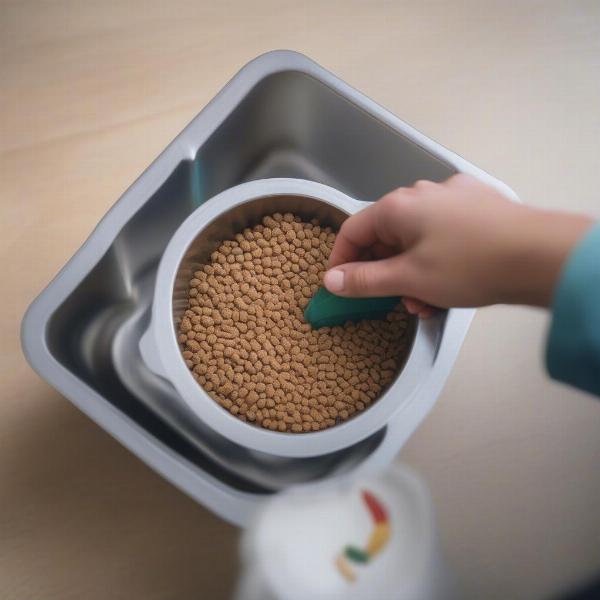Fat Dog Slim? It might sound like a catchy band name, but for many dog owners, it represents a serious goal. If your furry friend is packing a few extra pounds, this guide is here to help you navigate the journey to a healthier weight for your beloved pet. We’ll cover everything from recognizing the signs of obesity to implementing a safe and effective weight loss plan.
Recognizing Obesity in Your Dog
Is your dog just a little cuddly, or are they actually overweight? It’s important to be able to accurately assess your dog’s body condition. Ideally, you should be able to feel their ribs easily beneath a thin layer of fat. If their ribs are difficult to feel or their abdomen is distended, they may be carrying excess weight. A visit to your veterinarian is crucial to confirm obesity and rule out any underlying medical conditions.
Developing a Safe and Effective Weight Loss Plan
 Measuring Dog Food
Measuring Dog Food
Just like with humans, successful weight loss for dogs involves a combination of diet and exercise. Your veterinarian can recommend a specific weight loss food designed to provide optimal nutrition while restricting calories. dog weight loss food They can also help you determine the appropriate portion size for your dog’s breed, age, and activity level. Remember, slow and steady wins the race; drastic calorie restriction can be harmful.
The Importance of Exercise for Weight Loss
Regular physical activity is essential for shedding those extra pounds. The type and intensity of exercise will depend on your dog’s breed, age, and overall health. Daily walks, playtime in the park, and even swimming are great ways to burn calories and improve fitness. Start slowly and gradually increase the duration and intensity of exercise to avoid injury.
Common Mistakes to Avoid
One common mistake is giving too many treats. While treats can be a valuable training tool, they should be given sparingly. Opt for healthy, low-calorie treats or even use pieces of their regular kibble as a reward. can dog eat okra Another mistake is free-feeding, where food is left out all day. Scheduled mealtimes help regulate intake and prevent overeating.
Monitoring Progress and Maintaining a Healthy Weight
Regular weigh-ins are essential to track your dog’s progress. Your veterinarian can help you set realistic goals and adjust the weight loss plan as needed. Once your dog reaches their ideal weight, maintaining a healthy lifestyle is key to preventing weight regain. This includes continuing a balanced diet, regular exercise, and consistent portion control.
Conclusion
Helping your fat dog slim down is a journey that requires patience, commitment, and a tailored approach. By following the guidance of your veterinarian and implementing a safe and effective weight loss plan, you can help your furry friend achieve a healthier weight and enjoy a better quality of life. Remember, a healthy weight is crucial for preventing a range of health problems and ensuring your dog lives a long and happy life alongside you.
FAQ
- How can I tell if my dog is overweight? You should be able to feel your dog’s ribs easily beneath a thin layer of fat. If their ribs are difficult to feel or their abdomen is distended, they may be overweight.
- What should I feed my overweight dog? Consult your veterinarian for recommendations on a weight loss food and appropriate portion sizes.
- How much exercise does my overweight dog need? This depends on your dog’s breed, age, and overall health. Start slowly and gradually increase the duration and intensity of exercise.
- What are some common mistakes to avoid when trying to help my dog lose weight? Overfeeding, giving too many treats, and free-feeding are common mistakes.
- How often should I weigh my dog during their weight loss journey? Regular weigh-ins are important; your veterinarian can guide you on the frequency.
- What can I do to help my dog maintain a healthy weight once they reach their goal? Continue with a balanced diet, regular exercise, and consistent portion control.
- Can certain medical conditions cause weight gain in dogs? Yes, some medical conditions can contribute to weight gain. Consult your veterinarian to rule out any underlying issues.
About ILM Dog
ILM Dog is your trusted international resource for comprehensive dog care and nurturing advice. We offer expert guidance on various aspects of dog ownership, including breed selection, health, training, nutrition, grooming, and more. Whether you’re a seasoned dog owner or just starting your journey with a canine companion, ILM Dog provides reliable and practical information to help you care for your furry friend. Contact us for personalized support at [email protected] or +44 20-3965-8624.